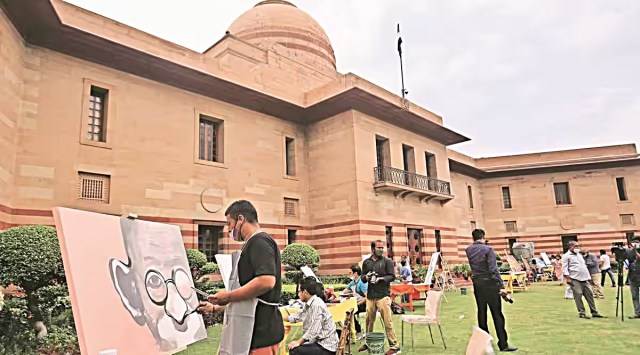IN THE summer of 2018, the Archaeological Survey of India (ASI) had stumbled upon a 4,000-year-old chariot during excavations in Uttar Pradesh’s dusty hamlet Sanauli.
The find, the ASI said, had the potential to “recalibrate” India’s position on the map of ancient history. In fact, this chariot was found to have many similarities with those unearthed in Mesopotamia, shedding light on the progress the Indian civilisation had made at the time, on par with the 2000 BC Mesopotamia.

To highlight this to the world during the upcoming G20 Leaders’ Summit, the remains of this chariot have been brought to Delhi’s National Gallery of Modern Art O(NGMA), as part of an exhibition of hundreds of such landmark objects that aims to put India’s civilisation glory on the world map.
Story continues below this ad
On September 9, as talking heads of the world deliberate upon geopolitics, food security and mitigation of conflicts at Bharat Mandapam, less than 2 km away at NGMA, their spouses will inaugurate “an exhibition dedicated to India’s civilisation prowess and artistic excellence”, titled ‘Roots and Routes: Past Present and Continuous’, being put together by the Ministry of Culture.
The 500-piece exhibition will also display Indian antiquities and sculptures (some even 2,500 years old), pre-modern paintings and manuscripts, sourced from various central government museums and galleries and ASI’s site museums, becoming the first-ever showcase that puts up all these priceless objects at one place. All the works being displayed here are originals from various government repositories, an official told The Indian Express.
The exhibits will take up almost the entire 12,000 square metres of exhibition space at NGMA, which is one of the largest modern art museums in the world. “The exhibition traces India’s roots and also explores interconnectedness — both within India and of India with the world,” the official said.
Some works have been brought on loan from the Indian Museum in Kolkata, which is among the oldest museums in the country; the Government Museum in Chennai; the National Museum in Delhi; the Mathura Art Museum; and the Government Museum and Art Gallery in Chandigarh. The museum in Chandigarh has sent 19 Gandhara sculptures, three terracotta sculptures from Akhnoor, two Buddhist metal sculptures of Nagapattinam and two Pahari miniature paintings for the exhibition.
Story continues below this ad
From Chennai, a selection of Buddhist relics of Amaravati and Chola bronzes have been received for the showcase. A body of bronze-cast sculptures made during the 10th to 13th centuries in southern India, Chola bronzes are especially known for depictions of Lord Shiva as Nataraja.
The 2,000-year-old Amaravati marbles, also from Chennai, are the remnants of a Buddhist stupa built by the Satavahana kings, and are considered among the oldest Buddhist art in the world. In recent years, India has been positioning itself as ‘the birthplace of Buddhism’, calling on tourists from around the world to visit the Buddhist Circuit, retracing the steps of Lord Buddha’s life and times through seven sites in the country.
Sources say since restitution and repatriation of cultural heritage is among the major themes of the cultural track of India’s G20 Presidency, Indian antiquities will be showcased in all their glory. During the first G20 Culture Working Group meeting in Khajuraho earlier this year, the government had organised a special exhibition dedicated to repatriated antiquities.
Officials said the exhibition has sections dedicated to India’s democratic ethos, shared traditions and outreach, also to sustainability and environment, in alignment with various G20 themes. “The Ministry of Culture has identified some of the most iconic artworks from across the country, and requested their loan for the exhibition,” they said, adding that the National Museum, New Delhi, is the nodal agency for handling the insurance and transportation of these works.









